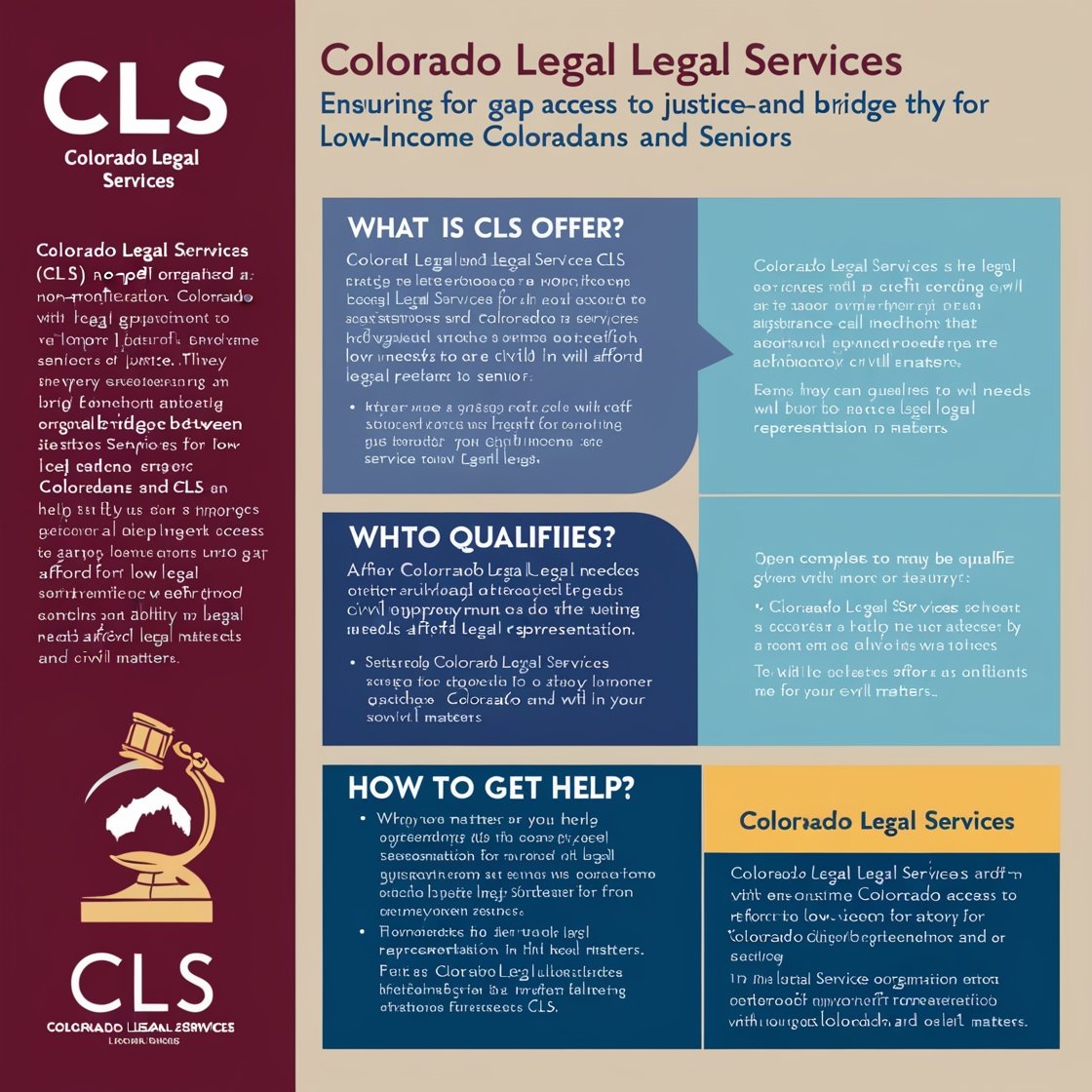Colorado Legal Services (CLS) is a non-profit organization dedicated to ensuring access to justice for low-income Coloradans and seniors. They bridge the gap between legal needs and the ability to afford legal representation in civil matters. This article explores what CLS offers, who qualifies for assistance, and how to get help.
Understanding Civil Legal Needs
Civil legal issues encompass a wide range of non-criminal matters that can significantly impact a person’s life. Here are some common areas where CLS can provide assistance:
Public Benefits Appeals:
The United States offers a variety of programs to support individuals with disabilities and low income. Social Security Disability Insurance (SSDI) provides financial assistance for workers who become disabled and are unable to continue working. Supplemental Security Income (SSI) offers cash benefits to low-income adults and children with disabilities, regardless of their work history. Medicaid is a health insurance program for low-income individuals and families, including those with disabilities.
Additionally, the Older Americans Act (OAA) funds a network of services for older adults, some of which can be crucial for those with disabilities, such as meals on wheels, transportation assistance, and home care. These programs, along with others, work together to create a safety net for people facing economic hardship due to disability or age.
Family Law:

The breakdown of a marriage can be a complex and emotionally charged process, often leading to issues surrounding child custody and financial arrangements. In some cases, where domestic violence has occurred, a legal separation through divorce may necessitate a protection order to ensure the safety of one spouse, or even the children. These situations require careful legal consideration, as the court prioritizes the well-being of minor children when determining custody.
Furthermore, the justice system offers safeguards for vulnerable elderly individuals through legal recourse for elder abuse, which can take various forms including financial exploitation, physical neglect, or emotional manipulation. Understanding the legal options available in these areas can empower individuals and families to navigate challenging situations and seek the protection they deserve.
Housing:
Maintaining a stable living situation is crucial, but unfortunately, issues can arise that disrupt this balance. These can range from disagreements with your landlord (landlord-tenant disputes) to facing eviction. Eviction is the legal process by which a landlord removes a tenant from a rental property, often due to unpaid rent or lease violations.
Security deposit concerns are another common point of contention, as this deposit is meant to cover any damages beyond normal wear and tear upon move-out. Underlying these issues can be fair housing discrimination, which is illegal and prohibits landlords from denying housing based on race, religion, disability, or other protected characteristics. It’s important to be aware of your rights and responsibilities as a tenant to navigate these situations effectively.
Debt Collection:
The Fair Debt Collection Practices Act (FDCPA) safeguards consumers from abusive and deceptive tactics employed by debt collectors. Understanding your rights under this act empowers you to effectively respond to unfair collection attempts. If you’re unsure about the legitimacy of the debt or believe the amount is incorrect, you have the right to dispute it within 30 days of receiving written notice from the collector. This compels them to cease collection efforts until they provide verification of the debt.
The FDCPA also protects you from harassment. Debt collectors cannot contact you before 8 am or after 9 pm, and they are prohibited from using profane or obscene language, threatening violence, or falsely claiming you’ll be arrested if you don’t pay. If a collector violates these or other FDCPA provisions, you can report them to the Federal Trade Commission (FTC) or your state’s attorney general. Remember, debt collectors must communicate in a professional and respectful manner, and you have the right to be treated fairly throughout the collection process.
Consumer Issues:
Our digital age offers incredible convenience, but it also opens the door to a variety of threats. Identity theft can wreak havoc on your finances and credit score, with criminals misusing your personal information to open accounts or make purchases. Scams come in all shapes and sizes, from phishing emails that try to steal your login credentials to fake online marketplaces peddling non-existent products.
And faulty products can not only leave you frustrated but also potentially endanger your safety, especially if electrical components or critical parts malfunction. To protect yourself, staying informed about the latest tactics and remaining vigilant is crucial. Regularly monitoring your financial statements, using strong passwords and being wary of unsolicited contacts can significantly reduce your risk of falling victim to these issues.
Employment Issues:
Unpaid wages, discrimination, and wrongful termination.
It’s important to note that CLS does not handle criminal or traffic cases.
Who Qualifies for CLS Assistance?
CLS prioritizes serving low-income Coloradans and seniors who meet specific income eligibility guidelines. These guidelines are based on the federal poverty level and can change year-to-year. CLS has an intake process to determine eligibility and assess the nature of the legal issue.
How to Get Help from Colorado Legal Services

If you believe you may qualify for assistance from CLS, here’s how to get started:
Visit the CLS website:
The platform functions as a one-stop shop for individuals seeking legal assistance. It offers in-depth explanations of the various legal aid services available, clearly outlining the eligibility criteria to ensure users can determine their qualification for support. Additionally, the platform incorporates a directory of local legal aid offices, allowing users to conveniently connect with the appropriate resources in their area. This centralized approach simplifies the process of finding legal help and empowers individuals to navigate the legal system with greater confidence.
Call the CLS hotline:
If you’re facing a legal issue in the Denver/Front Range area and are in need of assistance, Colorado Legal Services can be a valuable resource. They can be reached at (303) 837-1313. It’s important to note that unlike a traditional hotline providing immediate help, calling this number initiates their intake process. This means you’ll be connected with someone who can gather information about your situation and direct you to the appropriate legal aid program or services. While you won’t be speaking with a lawyer directly through this number, it’s a first step toward getting the legal help you need.
Seek legal aid through local partners:
The Colorado Legal Services (CLS) program works alongside a network of legal aid organizations throughout the state. To find out if there are resources available in your area, you can conduct a quick internet search using the phrase “legal aid near me + [your city/county]”. This search should lead you to local legal aid providers that may be partnered with CLS, offering free or reduced-cost legal assistance on a range of issues.
During the intake process, be prepared to provide details about your income, assets, and the legal issue you’re facing. A CLS representative will assess your eligibility and explore options for resolving your legal concern.
Additional Resources

Colorado Department of Labor and Employment – Legal Resources:
Colorado offers a variety of resources to assist residents with their legal needs. One key resource is Colorado Legal Services (CLS), a non-profit organization that provides free legal aid to low-income residents and seniors facing civil legal issues. In addition to CLS, the state’s Department of Labor and Employment maintains a directory of organizations that can offer free or reduced-cost legal services.
For those facing criminal charges and unable to afford an attorney, the Office of the State Public Defender is available to represent them. Finally, the Colorado Bar Association website includes a tool to help residents find private attorneys who may fit their specific needs and budget.
Pueblo County – Colorado Legal Services:
This webpage highlights the partnership between Pueblo County and CLS, specifically aimed at assisting older adults.
Colorado Legal Services plays a vital role in ensuring low-income residents and seniors have access to legal representation during challenging times. By understanding the services they offer, eligibility requirements, and how to get help, you can navigate civil legal issues with more confidence.
Check also:Legal Marketing Services is Legit?
Conclusion:
Colorado Legal Services (CLS) stands as a beacon of hope for low-income Coloradans and seniors facing civil legal challenges. They bridge the justice gap by providing essential legal representation in areas like housing, public benefits, and family law. Their dedication to serving these vulnerable populations strengthens communities and promotes stability.
While CLS cannot solve all legal problems, their services empower individuals to assert their rights, navigate complex legal issues, and achieve positive outcomes. By seeking assistance from CLS and utilizing available resources, low-income residents and seniors can find the legal support they need to move forward with greater peace of mind.
Frequently asked question
What is Colorado Legal Services?
What types of legal issues does CLS help with?
Housing problems (eviction defense, foreclosure prevention)Family law (child custody, support, domestic violence)Consumer debt (credit card debt, medical bills)Public benefits (unemployment insurance, food stamps)Access to healthcare
Am I eligible for CLS services?
How do I apply for CLS services?
What happens if I am not eligible for CLS services?
How much does CLS charge for services?
What are the benefits of using CLS?
Access to free or low-cost legal helpAssistance from experienced attorneys and paralegalsRepresentation in court, if necessary

